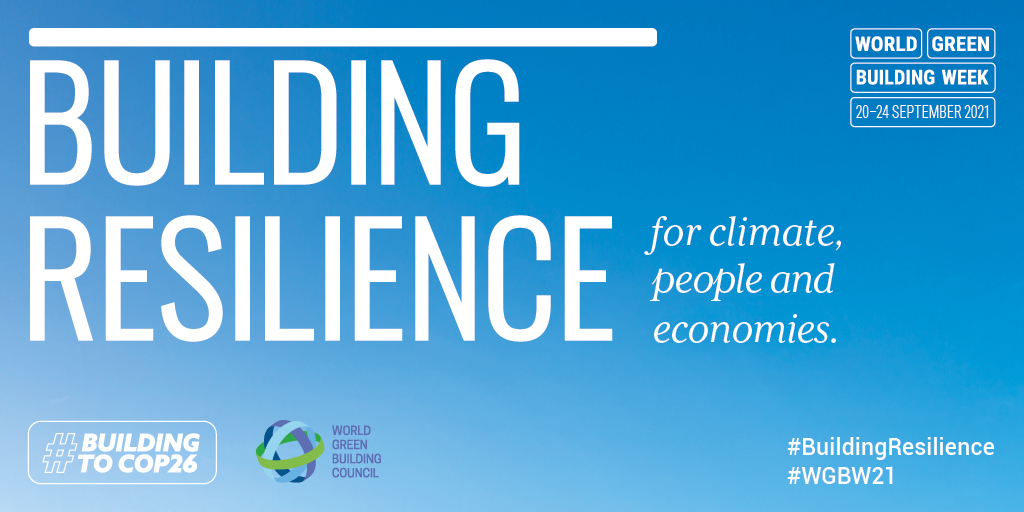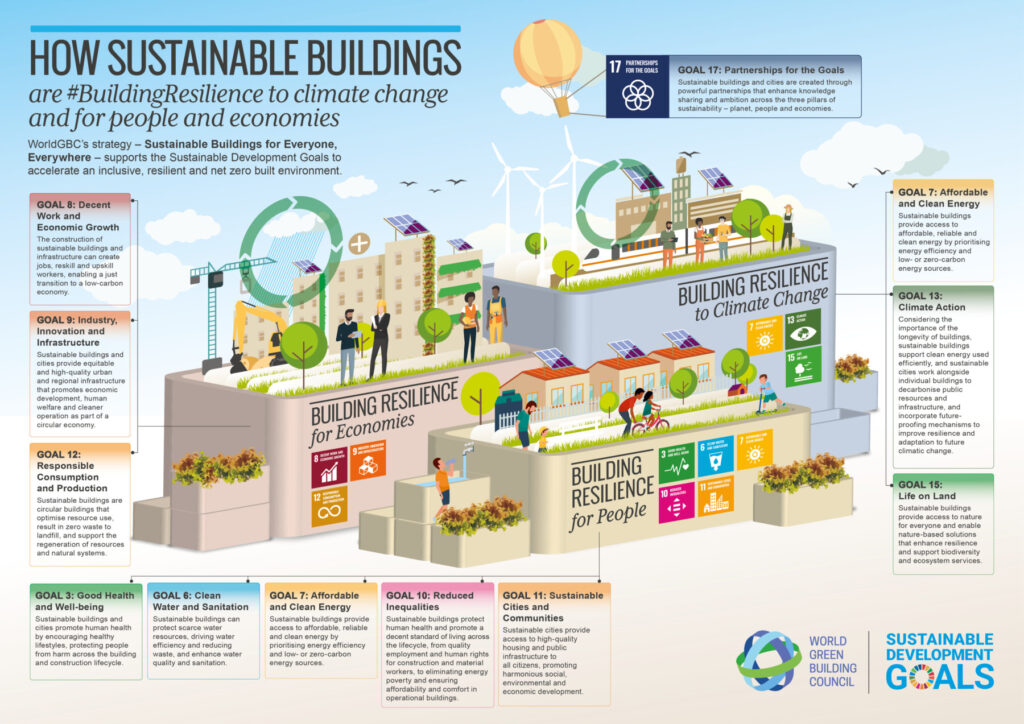This website uses cookies so that we can provide you with the best user experience possible. Cookie information is stored in your browser and performs functions such as recognising you when you return to our website and helping our team to understand which sections of the website you find most interesting and useful.

#BuildingResilience to Climate, People and Economies
In a year of disruption, it would be easier to focus on the challenges.
And building resilience doesn’t happen in a silo or through a singular approach.
As the UNFCCC works to bring resilience to the forefront of the climate agenda, we as a green building network have an opportunity. This World Green Building Week we will shine a light on how our holistic approach to building resilience can accelerate the Sustainable Development Goals and sustainable buildings for everyone, everywhere.
World Green Building Week 2021,
20-24 September #BuildingResilience
Download the campaign How To Guide
Download the campaign Infographics
Download the campaign Social Media Graphics
What is World Green Building Week?
World Green Building Week is the world’s largest campaign to accelerate sustainable buildings for everyone, everywhere.
Organised by the World Green Building Council (WorldGBC), it is led by our global network of 70 Green Building Councils and their 36,000 members.
Join us from the 20th–24th of September 2021 to find out how our network is accelerating the Sustainable Development Goals towards an inclusive and resilient net zero built environment.
Why is building resilience important?
Buildings are responsible for 38% of global energy-related carbon emissions and 50% of all extracted materials. Four billion people are vulnerable to climate risks and 91% of people worldwide live in areas with air pollution.
By 2050, the world’s building stock will double, increasing the impact of our sector significantly. Its demand on natural resources accelerates climate change, and inefficient, unhealthy buildings are affecting our livelihoods.
To close the environmental, social and economic gaps and protect our planet, people and economies, we must embrace a holistic approach to sustainability. We must work towards systemic changes that provide powerful solutions to climate change, improve human health and equity and drive a circular, regenerative economy.
-
#BuildingResilience to climate change
A resilient built environment combats climate change by enabling affordable and clean energy. It also accelerates the adaptation to, and mitigation of the impacts of climate change on our most vulnerable regions and communities. -
#BuildingResilience for people
The social dimensions of a resilient built environment can future-proof communities by addressing equity and climate justice issues. They can provide healthy environments and fairer access to vital social infrastructure such as schools, hospitals and green spaces. -
#BuildingResilience for economies
A resilient built environment grows green jobs and supports the regeneration of resources and natural systems, providing socio-economic benefit through a thriving circular economy.
Now is the time to deliver sustainable buildings so that we can build back better.

How the Sustainable Development Goals support #BuildingResilience
WorldGBC’s strategy – Sustainable Buildings for Everyone, Everywhere — we have identified three critical impact areas for the built environment and the Sustainable Development Goals associated with them:
-
Climate Action
-
Health & Wellbeing
-
Resources & Circularity.

How you can get involved
Learn
Through sustainable buildings we’re learning to build strong communities that are equipped to manage the impacts of climate change and where both people and economies can thrive.
Are you ready to learn more?
- Attend #BuildingResilience events on our events map.
- Learn how the built environment can deliver healthy, equitable and resilient buildings, communities and cities in the WorldGBC Health & Wellbeing Framework.
- Attend the WorldGBC #BuildingResilience events (20–24 September 2021).
- Learn about the UN’s Race to Zero and Race to Resilience campaigns.
- Discover examples of resilient buildings by following #BuildingResilience.
- Read our thought leadership on resilience in the built environment.
- Contact your local Green Building Council to find out what it is doing for World Green Building Week.
- Learn about sustainable buildings in our interactive case study map.
Share
Sharing information is a key factor in our campaign to bring to light how sustainable buildings can build resilience.
Are you ready to share what you’ve learnt?
-
Using our social media templates, share examples about how sustainable buildings are contributing to resilient built environments.
-
Using our social media templates, templates, share how you will support #BuildingResilience.
-
Add your World Green Building Week #BuildingResilience event to our events map.
-
Mention World Green Building Week in your speaking engagements and media interviews.
-
Add our email signature to your emails.
-
Share this ‘How To’ guide with your network and encourage them to support #BuildingResilience.
Lead
Taking an active leadership stance is a powerful tool to inspiring large-scale change. The following steps show how you can continue to drive our mission forward for climate, people and economies.
Are you ready to lead the change?
-
Using our marketing assets and organise your own #BuildingResilience event during World Green Building Week.
-
Support a healthy, resilient and equitable built environment by incorporating principles from our Health & Wellbeing Framework
in your projects. -
Release new reports or research on sustainable buildings that support #BuildingResilience.
-
Urge governments, policymakers and businesses to support more ambitious regulation to support sector decarbonisation.
Leadership opportunities
Businesses and governments have a unique opportunity to support our mission. Aligning with these campaigns urges others to join worldwide resilience-building networks.
- Join the UN’s Race to Zero.
- Become a Frontrunner in the Race to Zero by joining the Net Zero Carbon Building Commitment.
- Join your local Green Building Council for advice, information and best practice on sustainable buildings.
Contact us at office@worldgbc.org to find out more.
